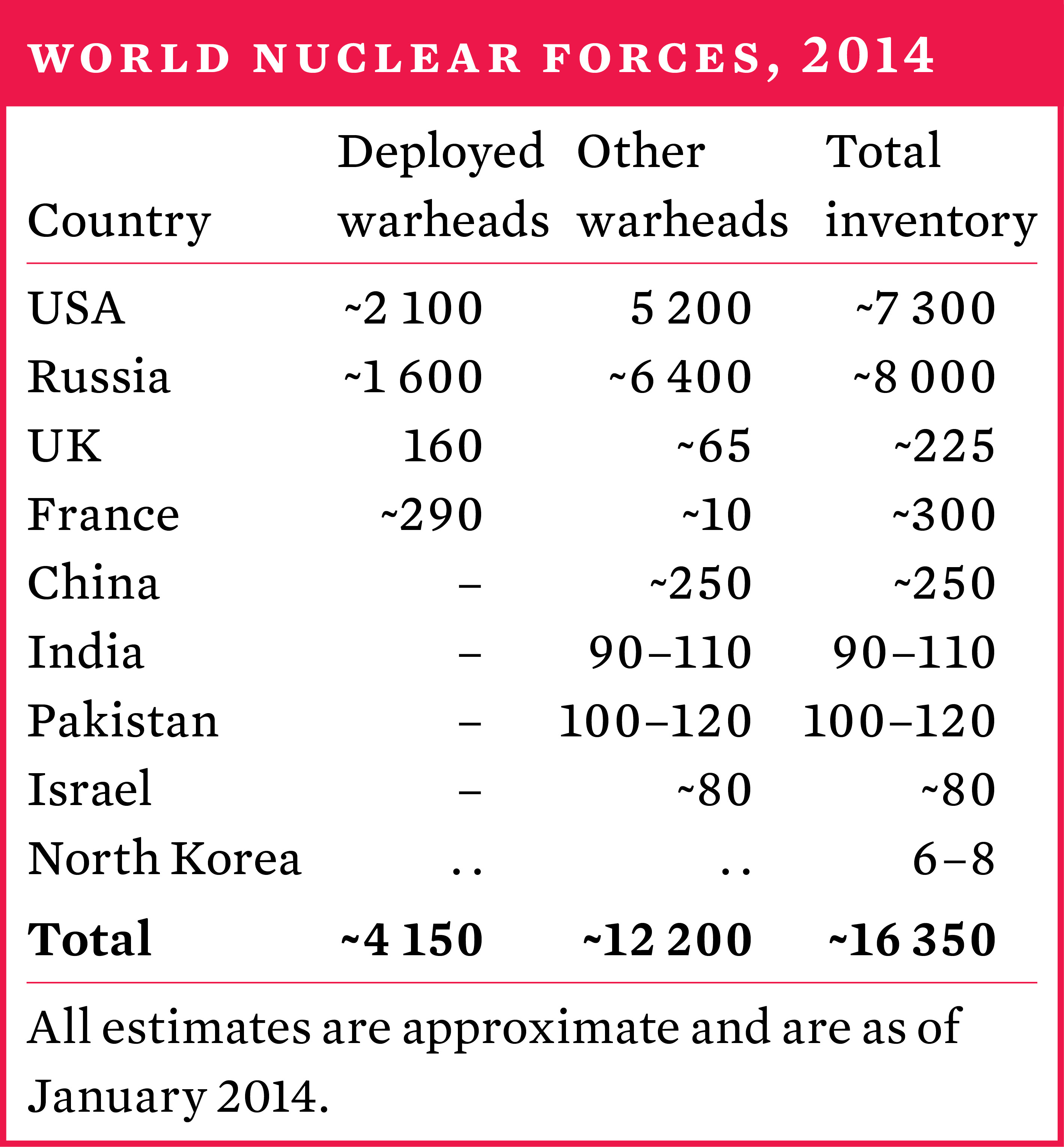6. World nuclear forces
SHANNON N. KILE AND HANS M. KRISTENSEN
- Overview [PDF]
SHANNON N. KILE AND HANS M. KRISTENSEN
- I. US nuclear forces [PDF]
HANS M. KRISTENSEN
- II. Russian nuclear forces [PDF]
HANS M. KRISTENSEN
- III. British nuclear forces [PDF]
SHANNON N. KILE AND HANS M. KRISTENSEN
- IV. French nuclear forces [PDF]
PHILLIP PATTON SCHELL AND HANS M. KRISTENSEN
- V. Chinese nuclear forces [PDF]
PHILLIP PATTON SCHELL AND HANS M. KRISTENSEN
- VI. Indian nuclear forces [PDF]
SHANNON N. KILE AND HANS M. KRISTENSEN
- VII. Pakistani nuclear forces [PDF]
PHILLIP PATTON SCHELL AND HANS M. KRISTENSEN
- VIII. Israeli nuclear forces [PDF]
PHILLIP PATTON SCHELL AND HANS M. KRISTENSEN
- IX. North Korea’s military nuclear capabilities [PDF]
SHANNON N. KILE, PHILLIP PATTON SCHELL AND HANS M. KRISTENSEN
- X. Global stocks and production of fissile materials, 2012 [PDF]
ALEXANDER GLASER AND ZIA MIAN*
- XI. Nuclear explosions, 1945–2013 [PDF]
VITALY FEDCHENKO
* International Panel on Fissile Materials
Summary
At the start of 2014 nine states—the United States, Russia, the United Kingdom, France, China, India, Pakistan, Israel and North Korea—possessed approximately 4150 operational nuclear weapons. Roughly 1800 of these are kept in a state of high alert, ready for use on short notice. If all nuclear warheads are counted—including operational warheads, spares, those in both active and inactive storage, and intact warheads scheduled for dismantlement—these states possessed a total of approximately 16 350 nuclear weapons, as compared with 17 270 at the beginning of 2013.
Nuclear arsenals
The total number of nuclear warheads in the world is declining, primarily due to the USA and Russia continuing to reduce their nuclear arsenals as a result of their 2010 Treaty on Measures for the Further Reduction and Limitation of Strategic Offensive Arms (New START) and unilateral reductions. Together, Russia and the USA hold more than 90 per cent of the global inventories of nuclear weapons. However, the pace of their reductions appears to be slowing compared with a decade ago. At the same time, all five legally recognized nuclear weapon states as defined by the 1968 Non-Proliferation Treaty (NPT)—China, France, Russia, the UK and the USA—are either deploying new nuclear weapon delivery systems or have announced programmes to do so, and appear determined to retain their nuclear arsenals indefinitely.
The nuclear arsenals of the other nuclear-armed states are considerably smaller. However, India and Pakistan continue to develop new systems capable of delivering nuclear weapons and are expanding their capacities to produce fissile material for military purposes. Meanwhile, there is an emerging consensus in the expert community that North Korea has produced a small number of nuclear weapons, as distinct from rudimentary nuclear explosive devices. In 2013 North Korea conducted a third nuclear test explosion and affirmed the central role of nuclear weapons in its national security strategy.
Reliable information on the status of the nuclear arsenals and capabilities of the nuclear-armed states varies considerably. The USA has disclosed substantial information about its stockpile and forces, and France and the UK have also declared some information. Russia refuses to disclose the detailed breakdown of its forces counted under New START (even though it shares the information with the USA), and the US Government has stopped releasing detailed information about Chinese and Russian nuclear forces.
The Indian and Pakistani governments provide statements about some of their missiles tests but no information about the status or size of their arsenals. Israel has a policy of not commenting on its widely suspected nuclear arsenal, and North Korea provides no information about its nuclear capabilities.
Estimated number of nuclear explosions, 1945–2013
On 12 February 2013 North Korea conducted its third nuclear test explosion. Most estimates of the yield vary between 5 and 16 kilotons. Since 1945 there have now been 2055 known nuclear explosions, carried out by eight states—the USA, the Soviet Union, the UK, France, China, India, Pakistan and North Korea. This total includes nuclear tests conducted in nuclear weapon test programmes, explosions carried out for peaceful purposes and the two nuclear bombs dropped on Hiroshima and Nagasaki in August 1945.
The Comprehensive Nuclear-Test-Ban Treaty (CTBT), which has not yet entered into force, would prohibit the carrying out of any nuclear explosion.
Stocks of fissile materials
Materials that can sustain an explosive fission chain reaction are essential for all types of nuclear explosives, from first-generation fission weapons to advanced thermonuclear weapons. The most common of these fissile materials are highly enriched uranium (HEU) and plutonium.
For their nuclear weapons, China, France, Russia, the UK and the USA have produced both HEU and plutonium; India, Israel and North Korea have mainly produced plutonium; and Pakistan mainly HEU. All states with a civilian nuclear industry have some capability to produce fissile materials.
The International Panel on Fissile Materials compiles information on global stocks of fissile materials.
Global stocks of fissile materials, 2013
| Global stocks, 2013 | |
|---|---|
| Highly enriched uranium | ~1285 tonnes* |
| Separated plutonium | |
| Military stocks | ~224 tonnes |
| Civilian stocks | ~268 tonnes |
* Not including 61 tonnes to be blended down.
